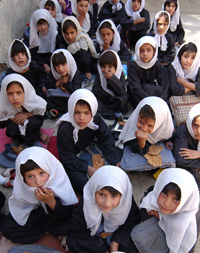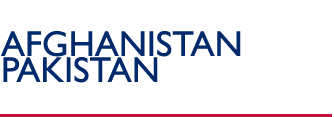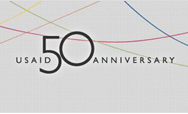 | |  |
 |
 |
| USAID
Information:
External Links:
|
|
 |
 |
|
 |
 |
 |
| USAID Information:
External Links:
|
|
 |
 |
|
 |
 |
|

Education of girls has become a cornerstone of building capacity and skills in both Afghanistan and Pakistan.
Contacts
Director, Office of Afghanistan and Pakistan Affairs, and Assistant to the Administrator
J Alex Thier
Senior Deputy Assistant to the Administrator
Larry Sampler
Deputy Assistants to the Administrator
Michele Schimpp
David McCloud
Press Inquiries
U.S. Agency for International Development
Office of Press Relations
Ronald Reagan Building
Washington, D.C.
20523-0016
Tel: 202-712-4320
Fax: 202-216-3524
Public Inquiries
USAID Mission in Afghanistan
USAID Mission in Pakistan
Afghanistan and Pakistan
Overview
Afghanistan and Pakistan, USAID's two largest assistance programs, reflect the United States' commitment to the region's long term stability and human progress. USAID's Office of Afghanistan and Pakistan Affairs brings together vast technical support, analysis and resources to enhance reconstruction and development.
USAID plays a critical role in President Barack Obama's national security strategy to disrupt, dismantle and defeat al Qaeda and to prevent its capacity to threaten the United States. USAID programs in agriculture, democracy and governance, economic growth, education, energy, health, and infrastructure provide Afghans and Pakistanis with the tools, technical support, capacity building and institutions for stability, sustainable development and self-sufficiency. The report USAID in Afghanistan: Partnership, Progress, Perseverance demonstrates the results achieved by USAID's programs in Afghanistan over the past decade.
A focus on "Afghan First"
In Afghanistan, USAID works in a "U.S. Government-as-a-whole" approach, cooperating with other government agencies along with our military counterparts to support Afghans, their government and their civic structures. This effort follows 25 years of war that has devastated the economy, institutions and people. It focuses on an "Afghan First" initiative which empowers Afghans and its institutions to take the lead in development and to transition to a better, self-sufficient national livelihood.
Guided by the Afghanistan/Pakistan Annual Review of December, USAID's FY 2012 Budget
Requests support the two directions: 1) Attaining stabilization goals; and 2) Establishing the basic key conditions to make investments sustainable.
Toward the first priority, in areas in which security has not yet transitioned to Afghans,
the focus will be to establish the conditions that will support stability through programs to
generate employment, resolve disputes, involve the population in their local governance, and
provide basic services in key population centers.
In locations where the security lead has transitioned to Afghans, the focus will be on foundational investments that can maintain stability, which at the same time drive growth and sustain legitimate governance.
Highlights of these investments include the energy sector, education and health, and skills development of the public. All these should create opportunities for institutions in Afghanistan to generate revenues, drive growth, and sustain development efforts.
A study released in November, 2011 (Afghanistan Mortality Survey) showed that declines in maternal mortality and child mortality are consistent with the delivery of USAID health care programs. The study also notes that life expectancy for both men and women has grown from an estimated 42 as reported by the World Health Organization to 62 years. To access the study and the key findings, please click here.
Building Pakistan's capacity to provide its citizens with services
With the support of the Enhanced Partnership with Pakistan Act of 2009 (also referred to sometimes as the "Kerry-Lugar-Berman Bill", for the co-sponsors, Senator John Kerry (D-Massachusetts), Senator Richard Lugar (R-Indiana) and Representative Howard Berman (D-California)), USAID aims to strengthen the Government of Pakistan's capacity to effectively provide services to its citizens and to address the country's urgent development needs, and to deepen a strategic partnership with the Pakistani people and their government. By supporting Pakistanis to create a stable and prosperous country, U.S. assistance will have a greater and more sustainable impact over the long-term.
The Enhanced Partnership with Pakistan Act is an authorization bill that sets the policy framework and parameters for U.S. Government assistance to Pakistan, as well as for the annual appropriations legislation through which USAID receives its funding. Senators Kerry and Lugar and Representative Berman support has been critical to development assistance's role in offering opportunity for Pakistan's people and leaders. The legislation focuses on development areas where USAID excels, and we're looking forward to enhancing our partnerships with the government and our implementing partners.
USAID, in conjunction with the U.S. Department of State, focuses assistance to Pakistan in four priority sectors: energy, stabilization, economic growth, and social sector within the current strategic and policy framework. Focusing our assistance in these four key areas will increase a national high visibility impact and effectiveness, as well as accelerate implementation.
With this funding, in Fiscal Year 2012, USAID aims to reduce the supply/demand gap of the energy sector in Pakistan to foster macroeconomic stability and economic growth; increase economic opportunities and employment through a more competitive private sector with a focus on agriculture; support stabilization activities in areas susceptible to violent activity by extremists; and facilitate greater access and quality of education and health care.
Success stories from Afghanistan and Pakistan
To find out more:
For more information about USAID's work in Afghanistan, please see:
http://www.usaid.gov/locations/asia/countries/afghanistan/
For more information about USAID's work in Pakistan, please see:
http://www.usaid.gov/locations/asia/countries/pakistan/
Back to Top ^ | 



